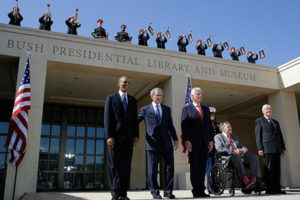I spent some time this week at the George W. Bush Presidential Library and Museum in Dallas; it’s the fourth such exhibit I have seen.
I intend to see them all eventually.
However, I have to acknowledge publicly a thought that I harbored privately as I walked through the Bush library/museum. Here goes:
What in the world is the Donald J. Trump library going to look like? How will the eventual former president portray his service? Will he even be able to develop a theme for an exhibit that traditionally is designed to portray some semblance of whatever legacy he leaves behind.
I know that some might view this as a cheap shot, as a stretch, as a way to stick it once more into the president’s eye. However, one’s mind cannot help but go to these places while touring an exhibit that is both somber and joyful simultaneously. The Bush library devotes plenty of text, audio and video to 9/11, the horrendous event that defined George W. Bush’s presidency. It also addresses his work to combat HIV/AIDS, his joyous and boisterous family and the man’s post-presidential work to help with disaster relief and his on-going support for our wounded warriors.
My wife and I have toured the Herbert Hoover library in West Branch, Iowa, the Jimmy Carter Center in Atlanta and the Lyndon Johnson library in Austin. They all speak to the presidents’ signature moments; the Hoover exhibit tells also of the former president’s humanitarian efforts.
What in the world is the Donald Trump library going to salute? What tone will the tributes take? How does this president manage to highlight the nation he serves without calling attention to himself?
That all assumes, of course, that Donald Trump is able to finish his term in office. There is increasing chatter that he, um, might not finish it. He is becoming entangled and enmeshed in growing legal difficulties. Those legal matters only exacerbate the political troubles that are sure to erupt as a consequence.
I am willing to admit to thinking of these things. If only the president of the United States would learn how to govern, learn how to behave the way his office compels him to behave, would understand the solemn responsibility he has assumed.
Donald Trump’s penchant for publicity — especially when it’s negative — makes it impossible for me to avoid thinking these things even when touring a presidential library and museum worthy of its name.
